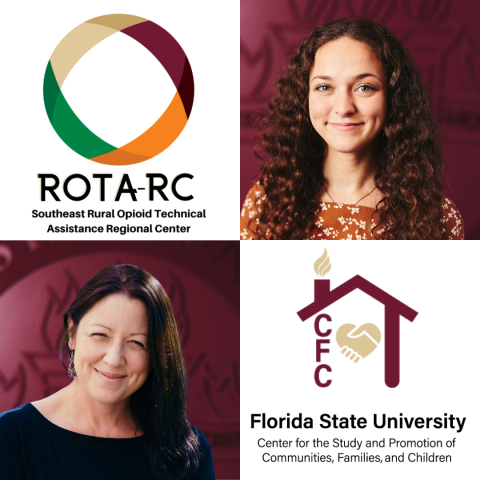The Importance of Involving Libraries in Opioid Epidemic Response

In September of 2022, the Center for the Study and Promotion of Communities, Families, and Children (CFC Center) at the FSU College of Social Work was awarded a two-year U.S. Department of Health and Human Services grant funding the Southeast Rural Opioid Technical Assistance Center (ROTA-RC).
ROTA-RC seeks to destigmatize substance use and educate communities on the opioid epidemic: how it affects them, and how to prevent substance dependence and life-threatening situations due to drugs. The challenge faced in rural areas like the 168 counties ROTA-RC is serving across Florida, Georgia, Mississippi, Alabama, Tennessee, Kentucky, North Carolina, and South Carolina is the ability to reach people in these communities.
Among the key community stakeholders for ROTA-RC are librarians, who are often at the forefront of major community challenges. Libraries are often one of the few localized and accessible community resources for rural populations, and librarians are often asked to provide resources and services that go above and beyond their training.
Librarians encounter many community populations most in need of assistance, including those looking for work, education opportunities, and resources like reliable internet and sometimes even a safe place to seek shelter. Libraries and their employees are often local and trusted members of the community, making them an ideal group to assist in Opioid Epidemic response.
“I was on a recent community outreach trip to spread the word about our resources to librarians,” Carli Lucius, the ROTA-RC community outreach specialist, remembered, “and while I was talking to a member of the community, she wondered why we were involving libraries in our work, posing the question ‘that's where the druggies hang out or something?’ The question floored me. I already knew how important our work was, but now I know just how much we need to do to help end the stigma on substance use in communities.”
Carli added, “Libraries are often the only place that is truly free of charge for community members to visit, making them a safe space for all people. By working with libraries, we can work to provide the most up-to-date, relevant information on the opioid crisis to communities to further destigmatize and support people who use substances.”
In a recent research article published by the Online Computer Library Center (OCLC), findings showed that involving libraries in Opioid response resulted in the following: increased community awareness and knowledge about the opioid crisis, a start in breaking down stigma against people who have substance use disorder, an increased positive perception of the library being essential to meeting local needs, and an increase in new partnerships and the expansion of existing ones, resulting in coordinated efforts that better meet community needs; among other outcomes.
Since librarians are such a key stakeholder, ROTA-RC leaders Dr. Margaret Sullivan, an assistant professor at the FSU College of Communication and Information, along with Carli, were tasked to develop and disseminate relevant opioid epidemic information and resources to librarians across the Southeastern U.S.
ROTA-RC is developing several resources for librarians. Two readily available, free resources are the Opioid Toolkit Training and Overdose Prevention Course.
“The opioid toolkit was created by the OCLC to give librarians and library staff actionable steps to take to counter the effects of the epidemic in their communities,” explained Dr. Sullivan. “It provides guidance on understanding local data, connecting with community resources, and creating programming.” This spring, six free online Opioid Toolkit Training sessions are scheduled from February through May for librarians and students. Other interested community stakeholders are invited to attend.
The other two resources, the Teen Wellness Rebound and Recovery Program and the Substance Use and Natural Disasters Training, are in development. The teen wellness program, to be released on April 10th, is self-paced training for librarians and direct providers working with youth that equips them to facilitate up to six lessons on teen personal wellness, healthy relationships, substance use, healthy eating and other wellness topics. The Natural Disasters training is anticipated to launch in 2024.
The ROTA-RC and the Center for the Study and Promotion of Communities, Families and Children are eager to collaborate with its network of academic institutions, cooperative extension offices, and other community stakeholders, including libraries, to stem the impact on rural communities and their citizens. Libraries remain critical in the fight against the opioid crisis.
To learn about other ROTA-RC's resources and opportunities, contact Carli Lucius at clucius@fsu.edu, visit SEROTARCNETWORK.ORG.
